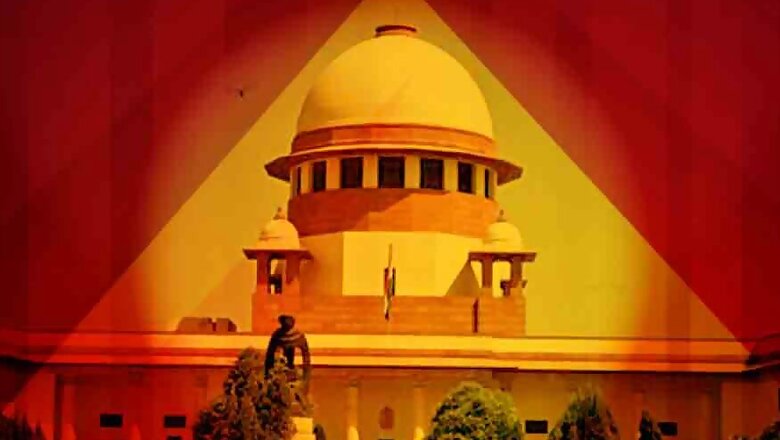
views
New Delhi: If 2018 could be remembered for anything that ushered in reforms, it would be from the stable of Judiciary. From standing up for the right of choice in choosing life partner to upholding the right to privacy by disallowing mandatory linkage of Aadhaar with services, this year the apex court delivered verdicts that have laid a foundation for future judicial reforms in the country. Here’s a look at some of the landmark verdicts of 2018:
Equal Rights for LGBT Community
Section 377, a 158-year-old colonial law, refers to 'unnatural offences' and states that whoever voluntarily has carnal intercourse “against the order of nature” with any man, woman or animal, shall be punished with imprisonment for life, or with imprisonment of either description for a term, which may extend to 10 years, and shall also be liable to pay a fine.
This section had been challenged in the Supreme Court in the way of an appeal against a 2013 verdict which had upheld Section 377. However, this year, the apex court decriminalised homosexuality.
Chief Justice of India (CJI) Dipak Misra, who headed the bench, said, "The LGBT community has the same rights as any ordinary citizen. Respect for each other's rights, and others are supreme humanity. Criminalising gay sex is irrational and indefensible."
Post this verdict, the homosexuals are now allowed to live as equal citizens in India and nobody can harass them on the basis of their sexual orientation. However, the apex court said that Section 377 would continue to be in force in cases of unnatural sex with children and animals.
No Mandatory Linking of Aadhaar
Constitutional validity of Aadhaar was a case that people kept a close watch on this year. The case witnessed one of the longest hearings in the judicial history, with even the CEO of UIDAI making a presentation in the Supreme Court explaining the technicalities of Aadhaar and its verification mechanism.
The SC ruled that Aadhaar is constitutional but making it mandatory to be linked to avail government services and benefits is unconstitutional. It also termed the practice of linking phone numbers with Aadhaar as unconstitutional.
Addressing the concerns regarding data privacy, the court also made the linking of identification card with private services as illegal. This also put an end to confusion regarding all those services for which Aadhaar is mandated.
However, Justice DY Chandrachud who dissented from the majority verdict and held that Aadhaar was constitutionally invalid as it was passed as a “money bill.”
Gender Equality Upheld: Women Can Enter Sabarimala
Sabarimala, the revered shrine of Lord Ayyappa in Kerala, has been in focus for the last one year as it did not allow women from ages 10 to 50 to enter the temple.
In a landmark verdict this year, the court in a 4:1 ratio verdict ruled that barring women entry into Sabarimala was violative of Article 21 (right to life and personal liberty) and Article 14 (right to equality).
The CJI stated that Article 25 has nothing to do with “gender or physiological factors.” This landmark verdict has now become a precedent for cases in the high courts where petitioners have challenged as to why women entry is barred in Nizamuddin Dargah and the Parsi Anjuman.
However, it was the lone woman judge on the bench, Justice Indu Malhotra, who dissented and stated that women from ages 10 to 50 must not be allowed to enter the shrine.
“The religious practice of restricting the entry of women between the ages of 10 to 50 years is in pursuance of an “essential religious practice” and “notions of rationality cannot be invoked in matters of religion by courts”, said Justice Malhotra and pointed out that none of the petitioners in the case were women from the community who usually perform the trek and enter the temple.
Recognition of Living Will for Passive Euthanasia
The Supreme Court recognised the ‘living will’ made by terminally-ill patients for passive euthanasia. A five-judge constitution bench headed by CJI Misra said passive euthanasia and advance living will are “permissible”.
The bench also laid down guidelines as to who would execute the will and how the nod for passive euthanasia would be granted by the medical board. It said that advance directives for terminally-ill patients could be issued and executed by the next friend and relatives of such a person after which a medical board would consider it.
Striking Down Adultery as Criminal Offence
In 2017, had a man indulged in sexual relations with a married woman without the permission of her husband, it would have been a crime. A petition in the top court challenged the law, saying it was arbitrary and discriminated against men and women.
Striking down adultery as a criminal offence and going beyond making it gender neutral, CJI Misra said that while it could be grounds for civil issues like divorce, "it cannot be a criminal offence".
This was the second colonial-era law struck down by the Supreme Court after it junked the 157-year-old law which criminalised gay sex in India.
A Step Towards Transparency — Live Streaming of Court Proceedings
In a bid to make legal proceedings transparent, the top court allowed live-streaming during court proceedings. A bench headed by CJI Misra said, "Sunlight is the best disinfectant." The bench said the move will bring more accountability and also help in enhancing the rule of law.
SC/ST Reservation in Promotions
This ruling came as a clarification on the Nagraj vs Union of India verdict where the court held that the verdict need not be referred to a seven-judge bench. The Bench held that the judgment in Nagaraj is wrong to the extent that it directs the collection of quantifiable data for providing reservations.
The dictum in Nagraj was held contrary to Indira Sawhney decision to the extent that it prescribed collection of quantifiable data of backwardness as a prerequisite for providing reservation in promotions.
In the 2006 verdict, the Supreme Court imposed three conditions — identification of backwardness, compelling reasons and inadequate representation — for granting quota in promotions to employees from Scheduled Caste and Scheduled Tribe communities. The court ruled that if reservation is implemented, it must not breach the 50% ceiling or “obliterate the creamy layer”.
Right to Change of Faith Is Part of Fundamental Right of Choice — Hadiya
Hadiya and Shafin Jahan’s marriage has been a hot topic since 2017 when it was alleged that Shafin forcefully converted Hadiya to Islam and was also hatching a plot to enter the ISIS terror module.
Hadiya was a 26-year-old homeopathy student who converted to Islam and subsequently married Shafin, a Muslim. The marriage was annulled by the Kerala High Court, which called it a “sham”.
Her father, Asokan KM, alleged that she was indoctrinated by a “well-oiled network” that recruits Indian citizens and trafficks them to strife-prone countries like Syria to work as “sex slaves”.
But Supreme Court set aside the Kerala High Court judgment annulling the marriage between Hadiya and Shafin Jahan. The apex court quashed the previous judgment in view of Hadiya’s statement during her appearance before the court in November 2017, and opined that the high court could not have annulled the marriage under Article 226 of the Constitution of India.

















Comments
0 comment